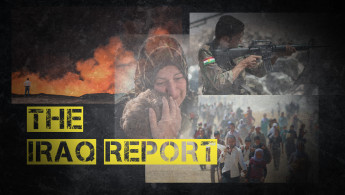The Iraq Report: Looking to a post-IS future
The Iraq Report is a new weekly feature at The New Arab.
Click here to receive The Iraq Report each week in your inbox
Though the fight against the Islamic State group grinds on - with a self-imposed Iraqi deadline of 21 May within which to conclude operations - international powers are already jostling for position, seeking to maximise their gains in any post-war settlement.
The usual suspects - the United States and Iran - are the main power players, and their presence can be felt in most events in Iraq. In particular, the state-sanctioned but Iran-backed Popular Mobilisation Forces (PMF), a paramilitary organisation dominated by armed Shia groups, feature as an underlying thread in many reports from the past week.
Meanwhile, the Kurds are also making a lot of noise about their long-called-for independence, though it remains to be seen if they can make a serious challenge or if they are using the threat of separatism as a political ploy.
The fight against IS
The Iraqi military announced mid-week that it had begun a new push in northwestern Mosul in an attempt to outflank IS positions. IS militants are currently focusing their strength against the army and Federal Police units - staffed largely by the Iran-backed Badr Organisation - around the Old City's southern boundaries.
It is highly unlikely that the army's manoeuvre - which has caused the deaths of at least 130 civilians - caught IS by surprise, but the extremist group simply lacks the manpower to be able to cover every single sector of the city, and is facing a force more than ten times their number.
That IS is being gradually pushed back in Mosul, as well as in the provinces of Salahuddin and Anbar, has meant that their heavily-stocked arms caches have fallen into the hands of the PMF. The PMF are reportedly stockpiling these weapons and selling on any surplus, allegedly through the black market to other under-supplied Iraqi units.
The Iraqi army's central command appears unable to get its hands on this equipment itself - despite much of it being originally taken from Iraqi bases when soldiers fled the lightning advance of IS in 2014. The PMF seems to have been prioritised, wielding influence over the main branches of the armed forces.
This will also further fuel fears that the PMF is being groomed to become the Iraqi version of Iran's Islamic Revolutionary Guard Corps (IRGC), a paramilitary force that keeps the army in check.
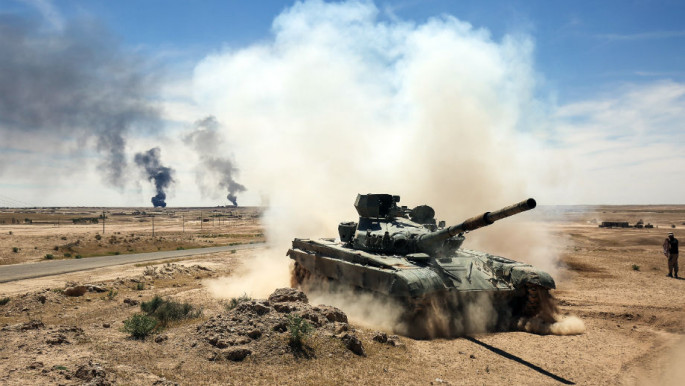 |
| A PMF tank advances towards Hatra, south of Mosul [AFP] |
Meanwhile, there are disturbing reports that IS losses are being exaggerated by Baghdad and the US-led coalition.
According to security sources who spoke to The New Arab, the Iraqi military has so far recovered only 439 bodies of IS militants since the Mosul operation began in October 2016. This comes despite estimations that IS began the battle with 6,000 men versus 100,000 Iraqi troops, Shia militiamen and Kurdish Pershmerga fighters - with the ensuing fighting claiming at least 4,000 IS militants.
It is highly unlikely that IS retrieved 3,500 corpses belonging to their own fighters and even less likely that their corpses were simply obliterated outright during the intense bombardment of Mosul's districts.
Iraqi defence sources are instead saying that it could mean that IS has instead melded with the local population in order to launch deadly attacks behind enemy lines once Mosul is cleared. However, this has the distinct ring of Baghdad seeking to enforce the post-IS securitisation of Mosul and recaptured Sunni Arab towns, under the pretext of suspected IS presence.
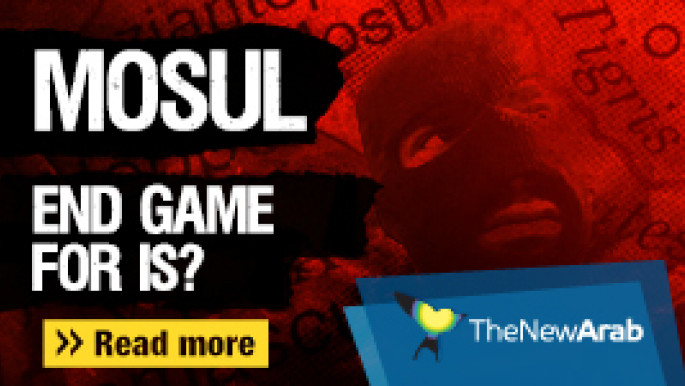 |
|
| Special coverage of the battle for Mosul |
This could also allow Baghdad to manipulate narratives around any future mass civilian casualty count.
The US in Iraq
The fears for civilian lives have reached such drastic levels that some Iraqi politicians from Nineveh province, of which Mosul is the capital, have begun calling for direct US involvement.
Iraqi plans are entirely IS-centric and lack a focus on preserving civilian lives, they say, leading to calls on Sunday for a withdrawal route to be opened so that militants could be pressured to withdraw from Mosul - to be destroyed elsewhere.
This, however, has sparked an angry reaction from Tehran-leaning quarters, including among the PMF, as reports emerged that US President Donald Trump used secret talks with Iraqi Prime Minister Haider al-Abadi to discuss a permanent US presence in Iraq.
Though Abadi, a member of the ruling Dawa Party, later denied such talks were taking place, his comments did not alleviate the anger expressed by the PMF.
| Video: Iraqi Christians return home |
Kata'ib Hezbollah, the Iraqi branch of the Lebanese Shia movement, denounced the prime minister and said Iraq's security forces and the PMF could do the job without US assistance. But without US and coalition airpower, Iraqi forces would have sustained far greater casualties than the already catastrophically high fatality figure of 8,000 men.
That figure is only for the Iraqi army, and does not include casualty counts for Shia militants in the PMF.
The Pentagon has deployed around 7,000 troops in Iraq under a variety of guises, including those branded as "military advisers" in order to sidestep Iraqi parliamentary approval for foreign combat troops on Iraqi soil. However, the Shia-dominated government is divided over whether the Iraqi military needs significant foreign support.
US troops and security contractors have a bad reputation among many Iraqis - Sunni and Shia alike - and predominantly because of the extensive damage to Iraq's infrastructure as well as the intolerably high fatalities resulting from the 2003 US-led invasion and subsequent occupation.
Negative perceptions of America's role in Iraq in recent years have also largely been fuelled by alleged illicit activities by its ex-military security contractors working in Iraq.
While US contractors are now being used to secure the Baghdad-Amman highway - recently the site of numerous anti-government ambushes, including by IS - at Baghdad's behest, Iraqis continue to have bad memories of mercenaries involved in numerous massacres against civilians during the American occupation.
This image was not helped when AP revealed that American contractors working for Sallyport Global were running an alcohol and prostitution smuggling ring out of Balad Airbase, north of the capital, where they were carrying out a $700 million contract to protect the base. According to the report, these mercenaries were working with pimps in Baghdad, many of whom directly connected to extremist Shia militias, gangs and sex traffickers.
Iraq's continued reliance on these contractors due to the unreliability of their own forces is demonstrative of a severe institutional and structural security flaw that will continue to drain state coffers and foster social backlashes against local norms, sensibilities and culture.
Iran in Iraq
One of Iraq's three vice-presidents has openly accused the government of allowing the fate of a Sunni town to be decided by Iran and its proxies. Ayad Allawi, the Shia Arab leader of the secular Iraqiyyah bloc, said that he had spoken to Abu Mahdi al-Muhandis, the commander of the PMF and a Kata'ib Hezbollah militant commander - and designated a "terrorist" by the United States - about allowing Sunni Arabs displaced in the fighting over Jurf al-Sakhr to return.
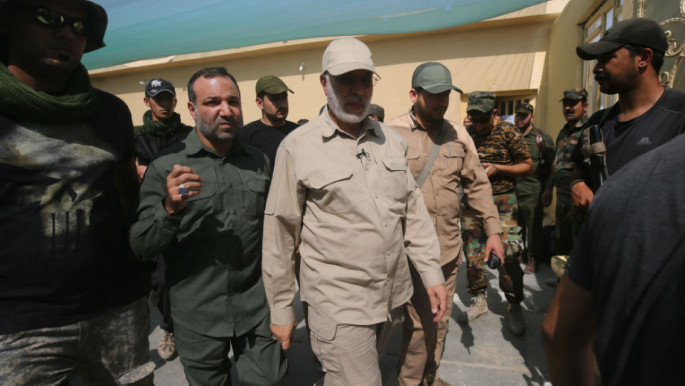 |
| Abu Mahdi al-Muhandis, the commander of the Iraqi Popular Mobilisation forces, pictured in 2016 [AFP] |
According to Allawi, the PMF commander told him that the decision was down to Iran and "a man in Lebanon".
Iran is not beholden to any person, party or authority in Lebanon, and Tehran enjoys significant influence over events in the small Mediterranean country, thanks to its control over Hisballah, the most powerful organisation in Lebanon.
The PMF leader's comments could therefore be perceived as misdirection to avoid tackling the issue of returning Sunni Arabs to their homes after they were displaced and accused of being IS sympathisers by sectarian militants seeking to cleanse areas of the ethno-sectarian group.
The persecution of Sunni Arabs transcends the military conflict, and has long been a feature of Iraq's post-2003 landscape.
A law passed last week banned politicians from attending foreign conferences without the prior approval of the government and, like many laws in Iraq, it is already being used as a weapon against vulnerable groups.
Former Prime Minister Nouri al-Maliki's Shia-led State of Law bloc has now cited the law, and accused mainly politicians of spying for foreign powers after a series of international conferences sought to unify Sunni Arab ranks and to reduce their marginalisation.
Maliki failed to mention that his own party, the Dawa Party, has attended numerous conferences in Iran.
He and other politicians supportive of the measure also missed the irony that they themselves came to power by attending meetings and conferences organised by foreign powers against the Baathist regime of Saddam Hussein, toppled in 2003 by the US.
Such laws, including the controversial Anti-Terrorism Law and the De-Baathification Law, predominantly target Sunni Arabs as the most likely opposition group who may present a threat to the political process. However, it is not only Sunnis but other Iraqis who dissent against Baghdad's excesses that are targeted, and therefore many of these laws are considered to be tools geared towards suppressing dissenting voices.
Iraqi Kurdistan
Perhaps the most prolific dissenters against Baghdad's rule are the Kurds, who enjoy autonomy under the aegis of the Kurdistan Regional Government. The Kurds have long demanded further autonomy and even independence from the rest of Iraq, citing historical allegations of abuses and racism.
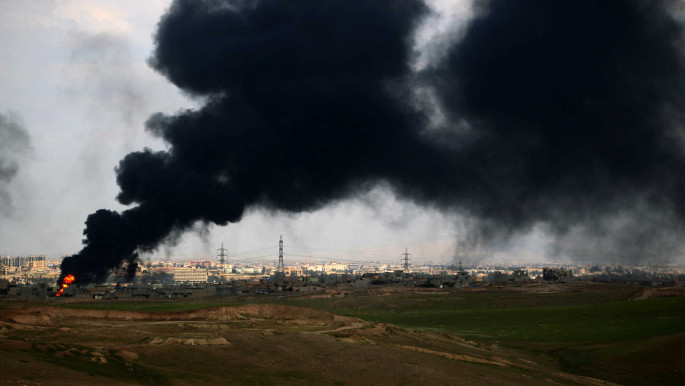 |
| Smoke billows from northwestern Mosul neighbourhood of Musharifah, on May 4, 2017, during an offensive by Iraqi security forces [AFP] |
But the KRG and its constituent factions are not exactly innocent of the sins of which they accuse their oppressors in Baghdad.
In Kirkuk, a multi-ethnic, oil-rich city in Iraq's north - claimed by both Baghdad and the Erbil-based KRG - Human Rights Watch on Sunday accused Kurdish security forces of expelling Sunni Turkmen from the city and the surrounding area.
According to HRW, Kurdish forces were forcing the Turkmen to go to areas controlled by Shia militants.
The Kurds have often complained of being subjected to ethnic cleansing, but forcing Turkmen from the city of Kirkuk, having previously targeted Arabs living in the city, while destroying Arab but not Kurdish homes in former IS-held territory to prevent the Arab population from returning, smacks of the pot calling the kettle black.
Many of those expelled have been fleeing the fighting raging around them, and all are Iraqi citizens with a right to reside anywhere in the country.
Such anti-Turkmen and anti-Arab human rights violations are not limited to ethnopolitical concerns, but reportedly also involve Kurdish security forces perpetrating some 90 violations against journalists in the first four months of 2017. The Center for the Defense of the Rights of Journalists said these included threats, beatings, arrests and even murder.
The abuses against freedom of speech and the right to a free press stand in stark contrast to the popular image in the western world of the Kurdistan region being a bastion of freedoms and democracy, even as the KRG gears up for an independence referendum in September, risking a conflagration with Baghdad after 14 years of relative peace.
The Iraq report is a new weekly feature at The New Arab.
Click here to receive The Iraq Report each week in your inbox
